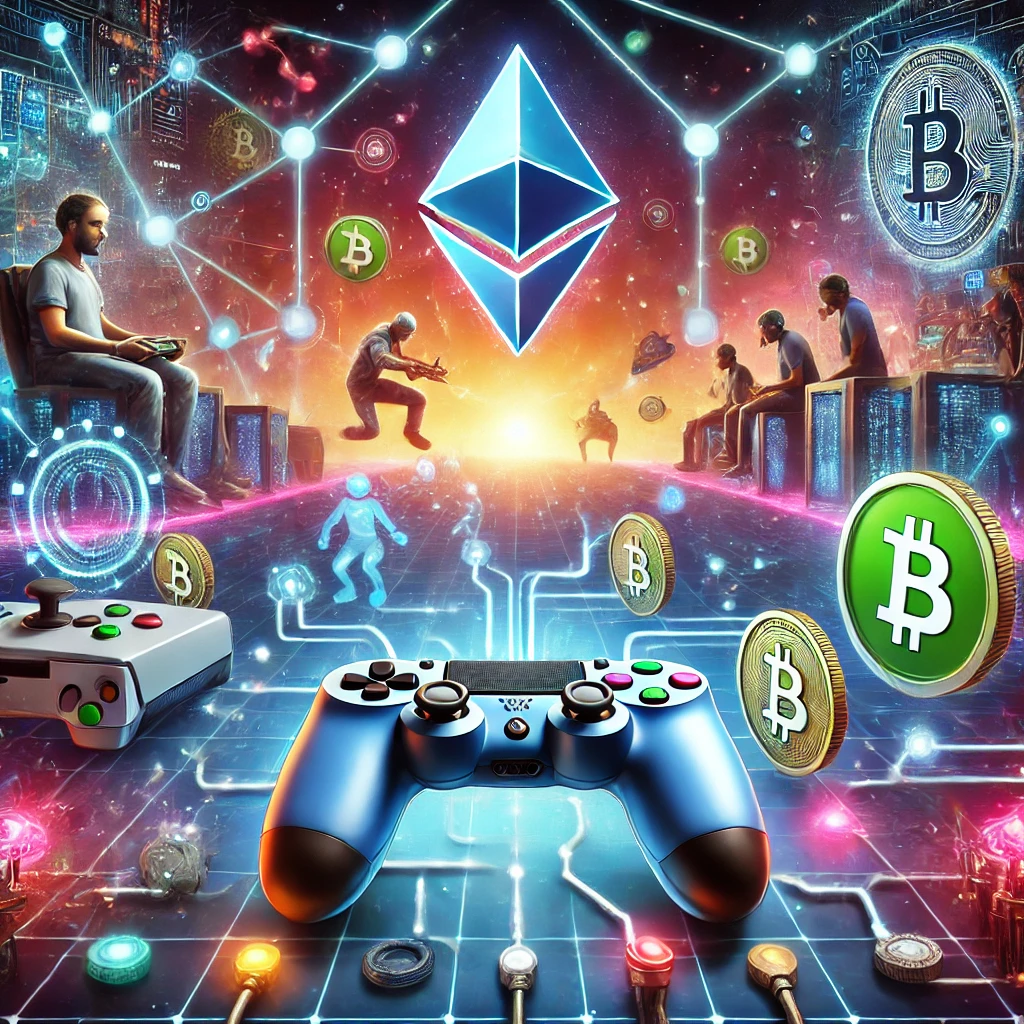The gaming world is evolving, and at the intersection of technology and entertainment lies a new frontier—crypto gaming. This exciting trend is transforming how players engage with games and perceive in-game assets. Players can now earn real-world currency through gameplay and trade digital assets in decentralized marketplaces. Crypto gaming merges blockchain technology with interactive entertainment, marking a revolution in the industry.
In this post, we’ll explore what crypto gaming is, how it works, and why it could be the future of gaming.
What is Crypto Gaming?
Crypto gaming uses blockchain technology and cryptocurrencies within video games. Unlike traditional games, where game developers and servers control in-game assets, crypto games offer true ownership of digital items. This is made possible through non-fungible tokens (NFTs). These tokens serve as proof of ownership. Because they are stored on decentralized blockchain networks, players can trade, sell, or hold them, much like any cryptocurrency.
At the heart of crypto gaming are two key elements:
- Cryptocurrency Integration: Players can earn or spend cryptocurrency, like Bitcoin or Ethereum, directly within games.
- NFT-based Assets: In-game items, characters, and collectibles are represented by NFTs. Players can sell or trade them across platforms, extending their utility beyond a single game.
How Does Crypto Gaming Work?
To understand how crypto gaming functions, let’s break it down into a few components:
Blockchain Technology: Blockchain networks (like Ethereum, Solana, Binance Smart Chain) power these games. This ensures that all transactions, trades, and asset ownerships are transparent, secure, and decentralized.
Play-to-Earn (P2E): Unlike traditional “pay-to-win” models, crypto games use a play-to-earn structure. Players can earn tokens, cryptocurrencies, or NFTs by participating in in-game activities.
Decentralized Marketplaces: Instead of being confined to one game, players can trade items on open markets that support NFT trading. For example, a sword won in one game could be sold on a blockchain marketplace. The proceeds can then be used in real life or another game.
Smart Contracts: These are self-executing contracts with the terms written into code. In gaming, they automate and secure transactions, ensuring they cannot be altered.
The Appeal of Crypto Gaming
Benefits for Players
Crypto gaming offers several benefits to players:
Real Ownership: In traditional games, in-game purchases like skins or weapons remain within the game ecosystem. In crypto games, these assets become the player’s property, recorded on the blockchain.
Monetization: Players can now earn money for their time and skills. Games like Axie Infinity demonstrate how players can generate significant income through gameplay.
Interoperability: Blockchain allows game items to be used across multiple games or traded for real money.
Advantages for Developers
Crypto gaming also opens new opportunities for developers:
New Revenue Streams: Developers can earn royalties from secondary NFT sales.
Decentralized Ecosystem: Developers benefit from a community-driven development process, where players can propose and implement game modifications, assets, or rules.
Increased Security: Blockchain provides a higher level of protection against hacks or item duplication, both of which are common issues in traditional online games.
Challenges and Criticism
While crypto gaming holds immense potential, several challenges remain:
Environmental Impact: Some blockchain networks, like Ethereum, have faced criticism for their high energy consumption. However, the shift to more eco-friendly chains is gradually addressing this issue.
High Entry Costs: Some games require upfront investments in NFTs or tokens, making it difficult for new players to get started.
Regulatory Concerns: Cryptocurrency regulations are still evolving, and crypto games could face legal challenges in certain regions.
The Future of Crypto Gaming
The future of crypto gaming appears bright, with many experts predicting that GameFi (the fusion of gaming and decentralized finance) will fuel significant growth in the industry. Major studios are already exploring blockchain technology, and platforms like Epic Games have opened doors to NFT-based games.
Expect to See These Developments in the Coming Years
AAA Blockchain Games: Major studios will likely produce blockchain-based titles with high production values, bringing crypto gaming into the mainstream.
More Interconnected Worlds: Expect games to become even more interoperable, allowing assets and characters to move fluidly between different titles.
Enhanced Player Communities: Decentralized governance models will enable players to influence game development, resulting in more community-driven games.
Conclusion
Crypto gaming is more than just a trend. It represents a paradigm shift in how players interact with virtual worlds. With blockchain, players can enjoy true ownership, earning potential, and increased engagement. Developers also benefit from new revenue streams and community-driven ecosystems.
As technology advances and more players adopt these systems, crypto gaming could become the future of the entire gaming industry. It’s a thrilling time for both gamers and developers as they explore the endless possibilities this space offers.
FAQs
What is crypto gaming?
Crypto gaming is the use of blockchain technology and cryptocurrencies within video games, offering players true ownership of digital assets and new ways to earn money.
How does crypto gaming differ from traditional gaming?
In crypto gaming, players can own, trade, and sell in-game items (NFTs) across different platforms, which is not possible in traditional gaming. Additionally, players can earn cryptocurrency through gameplay.
Why is crypto gaming becoming popular?
Crypto gaming provides real ownership of assets, monetization opportunities, and the potential for cross-game interoperability, which appeals to both players and developers.
What are the challenges of crypto gaming?
Challenges include high energy consumption of certain blockchains, upfront costs for players, and evolving regulations surrounding cryptocurrencies.
Will crypto gaming become mainstream?
Yes, with the rise of AAA blockchain games and the adoption of decentralized technologies by major studios, crypto gaming is poised to become mainstream in the coming years.
How do NFTs work in crypto gaming?
In crypto gaming, NFTs represent in-game items, characters, or collectibles. These NFTs can be traded or sold across platforms, giving players true ownership and value outside the game.
Prefer watching videos? Check out our YouTube channel where we turn our blogs into videos! Stay ahead in crypto gaming—subscribe now for exclusive content.
If you want more like this, read our related blog here!



